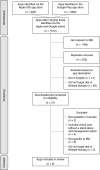Identification and Evaluation of Mobile Applications for Self-Management of Diet and Lifestyle for Patients with Inflammatory Bowel Disease
- PMID: 37811532
- PMCID: PMC10558196
- DOI: 10.1093/jcag/gwad029
Identification and Evaluation of Mobile Applications for Self-Management of Diet and Lifestyle for Patients with Inflammatory Bowel Disease
Abstract
Background: Mobile health applications (apps) providing diet and lifestyle self-management programs to patients with inflammatory bowel disease (IBD) are emerging. The objective of this study was to evaluate current apps available in the US and Canada based on app quality, perceived impact on diet and mental health and comprehensiveness to support self-management.
Methods: The Apple iOS and Google Play app stores were searched for terms related to IBD. Apps were included if they targeted diet and lifestyle behaviours for patients living with IBD and were available to the general public. Apps were excluded if they were not specific to IBD, not available in English, did not target diet or lifestyle therapy, were not available in the US and Canada, or did not offer stand-alone self-management programs. The Mobile App Rating Scale was used to assess mobile app quality.
Results: A total of 1,512 apps were identified through the app stores. Six apps met inclusion criteria. My IBD Care: Crohn's and Colitis received the highest quality rating and LyfeMD received the highest overall app rating. Only these two apps provided behaviour tracking over time, and three (50 percent) apps provided good-quality information.
Conclusions: While many IBD-related apps exist, few support self-management of diet and lifestyle behaviours. The My IBD Care and LyfeMD apps had the highest ratings and can be used to track lifestyle behaviours. The effectiveness of these apps to improve behaviours, and subsequently impact the disease course and quality of life, should be explored in future studies.
Keywords: MARS; inflammatory bowel disease; mobile applications; rating; self-management.
© The Author(s) 2023. Published by Oxford University Press on behalf of the Canadian Association of Gastroenterology.
Conflict of interest statement
CML was paid on contract for services provided to LyfeMD Inc. and is an employee in the research laboratory of one of the founders of LyfeMD Inc. VR was an employee in the research laboratory of one of the founders of LyfeMD Inc. and is currently an employee of LyfeMD Inc. SLG was supported by the Crohn’s and Colitis Foundation CRIA Career Development Award and member in the Medical Advisory Board, Nutrition Therapy for IBD Group.
Figures
References
-
- Dahlhamer JM, Zammitti EP, Ward BW, Wheaton AG, and Croft JB.. “Prevalence of Inflammatory Bowel Disease Among Adults Aged ≥18 years—United States, 2015.” MMWR Morbidity and Mortality Weekly Report 65, no. 42 (2016): 1166–69. - PubMed
-
- Kaplan GG, Bernstein CN, Coward S, Bitton A, Murthy SK, Nguyen GC, Lee Kate, Cooke-Lauder Jane, and Benchimol Eric I.. “The Impact Of Inflammatory Bowel Disease in Canada 2018: Epidemiology.” Journal of the Canadian Association of Gastroenterology 2, no. Suppl 1 (2019): S6–S16. 10.1093/jcag/gwy054. - DOI - PMC - PubMed
-
- Ananthakrishnan AN, Luo C, Yajnik V, Khalili H, Garber JJ, Stevens BW, Cleland T, and Xavier RJ.. “Gut Microbiome Function Predicts Response to Anti-Integrin Biologic Therapy in Inflammatory Bowel Diseases.” Cell Host and Microbe 21, no. 5 (2017): 603–610.e3. 10.1016/j.chom.2017.04.010. - DOI - PMC - PubMed
LinkOut - more resources
Full Text Sources
Medical
Miscellaneous

